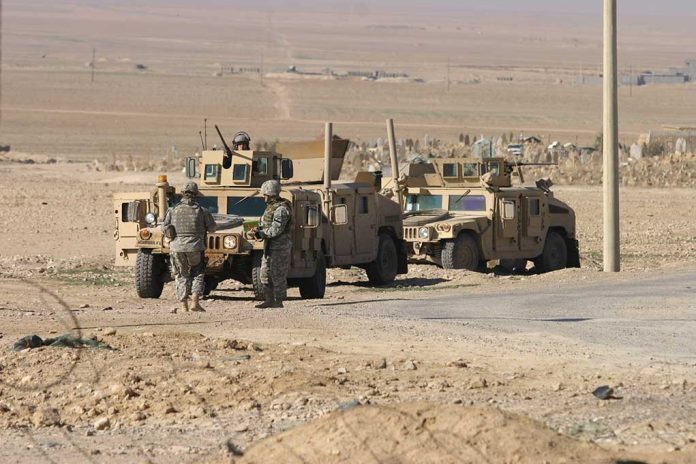
Iran has issued a stark ultimatum to the United States: be held legally responsible for any Israeli strike on Iranian nuclear facilities, as tensions reach a boiling point ahead of critical negotiations.
Key Takeaways
- Iran has officially warned the US it will be held accountable as a “participant” in any Israeli attack on its nuclear sites
- Foreign Minister Abbas Araghchi threatened “special measures” to defend nuclear facilities if Israeli threats continue
- US intelligence suggests Israel is preparing for potential strikes on Iranian nuclear facilities, potentially derailing upcoming talks in Rome
- Iran continues uranium enrichment at 60% purity, far beyond the 3.67% limit established in the 2015 nuclear deal
- The Revolutionary Guards have promised a “devastating and decisive response” to any Israeli military action
Iran’s Bold Threat Against America
As the fifth round of nuclear negotiations approaches, Iran has dramatically escalated its rhetoric by explicitly warning that the United States would bear legal responsibility for any Israeli military action against Iranian nuclear facilities. The warning came directly from Iran’s mission to the United Nations, which stated unequivocally: “In the event of any attack against the nuclear facilities of the Islamic Republic of Iran by the Zionist regime, the government of the United States shall bear legal responsibility, having been complicit therein.” This provocative stance comes amid reports from US intelligence sources suggesting Israel is making concrete preparations for potential strikes against Iran’s nuclear infrastructure.
Iran’s Foreign Minister Abbas Araghchi reinforced this position with his own warning to both Israel and the international community. “Iran strongly warns against any adventurism by the Zionist regime of Israel and will decisively respond to any threat or unlawful act by this regime,” said Araghchi. The foreign minister further emphasized that if preventive measures against Israeli threats are not taken by international bodies, Iran would be compelled to implement “special measures” to defend its nuclear facilities and materials. This explicit linking of US culpability to Israeli actions represents a significant escalation in Iran’s diplomatic strategy.
Iran warns attack on its nuclear sites will lead to ‘widespread regional war’
— Press TV 🔻 (@PressTV) January 31, 2025
Nuclear Negotiations at Critical Juncture
The timing of these threats is particularly significant as they come just before the next round of US-Iran negotiations scheduled to take place in Rome. These talks represent the fifth attempt to curb Iran’s uranium enrichment program in exchange for sanctions relief. President Trump’s team will be represented by Mideast envoy Steve Witkoff and State Department policy planning director Michael Anton. The negotiations face significant hurdles, not least Iran’s continued enrichment of uranium to 60% purity, which is far beyond any civilian requirements and dangerously close to weapons-grade material of 90%.
“Iran really does feel that it has paid a huge cost for its right to enrich on its own soil. It has not only paid billions in actually setting up the infrastructure, but it has paid billions in sanctions that were imposed on it and the loss of oil sales,” said Ellie Geranmayeh from the European Council on Foreign Relations.
The 2015 nuclear deal originally permitted Iran to enrich uranium to just 3.67% purity. However, following America’s withdrawal from the agreement in 2018, Iran gradually ramped up its enrichment activities, citing that decision as justification. Iranian officials continue to argue they have the right to enrich uranium under the nuclear non-proliferation treaty, while the US position remains firm that Iran must end all enrichment activities. This fundamental disagreement represents perhaps the most significant obstacle to reaching any new agreement.
Military Tensions Escalating
The Islamic Revolutionary Guard Corps (IRGC) has promised a “devastating and decisive response” to any Israeli attack, significantly raising the stakes of potential military action. Israeli officials have not confirmed preparations for strikes but have repeatedly threatened to take action against Iran’s nuclear program if diplomatic efforts fail. US intelligence reports indicate that Israel may be preparing contingency plans for military strikes against multiple Iranian nuclear facilities, potentially with or without American approval.
“They are trying to frighten us with war but are miscalculating as they are unaware of the powerful popular and military support the Islamic Republic can muster in war conditions,” warned Alimohammad Naini, an Iranian political analyst.
The White House has confirmed that President Trump recently spoke with Israeli Prime Minister Benjamin Netanyahu, discussing among other matters “a potential deal with Iran.” White House press secretary Karoline Leavitt described the conversation as “productive” and indicated that the president believes negotiations are “moving along in the right direction.” However, Iran’s latest threats and Israel’s apparent military preparations suggest that diplomatic breakthrough remains elusive while the risk of regional conflict continues to grow.



